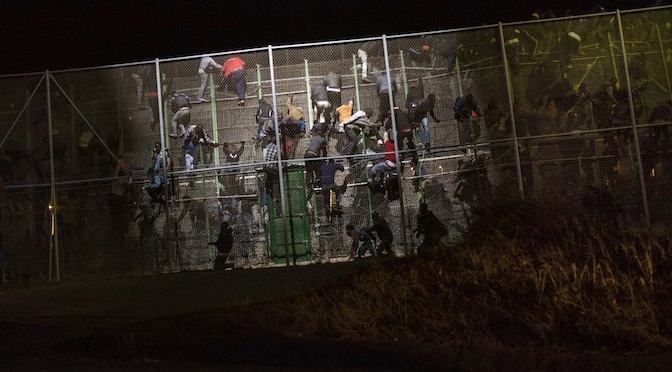Between Morocco and the small Spanish territory of Melilla there is a border fence that runs three layers deep and 23 feet high. Separating the two with 11km of barbed wire-topped barriers, the Spanish-constructed boundary is in place to keep ‘illegal immigrants and smugglers’ out of Spain, and by implication the European Union. This particular wall is one of only a few access points into Europe for those desperate to leave Africa that doesn’t involve a water crossing. Melilla is also popular because a lack of repatriation agreements with countries such as Cameroon, Niger and Mali has resulted in many of those who complete the climb eventually being taken to the Spanish mainland.
Over 1000 Sub-Saharan Africans coordinated a mass storming of this boundary in May this year, and 400 people successfully scaled the border. In another organised attempt in March, 500 people made it over. Let’s be real clear, these people take massive risks, suffer injuries and then enter into the politics of refugee regulations. The reward at the end of this treacherous journey is residency in a refugee camp, and possible repatriation back to their country of origin. Climbing one wall is only the first of many obstacles to come. All of which is endured for the promise of residency and work in Europe. Access to Spain may be granted, but official residency or work permits are not. The fact such a vulnerable existence is considered worthy of this amount of struggle is stark testament to the nature of the lives these people are fleeing.
I recently migrated to Berlin, a city synonymous with ‘The Wall’, and compared to that of the Melilla border crossers’ my experience has been seamless. Sure there have been challenges, but my age, class, gender and educational background have allowed me to glide through European borders. I’m also aware that at any moment I can return to Aotearoa, New Zealand.
When I see remnants of the Berlin Wall, I often think about contested physical boundaries that still exist. Israel and Palestine; North and South Korea; the US and Mexico frequently come to mind. So too do shifting boundaries – like the one between the Ukraine and Russia, and the upcoming vote on Scotland’s independence from the United Kingdom. In my own imagination I believe I can go anywhere and that life is as fluid as my bank balance will allow. But it’s not, and considering migration, and the drivers behind it, can offer a unique perspective on social inequality. Our ability to transcend geopolitical boundaries is tightly linked to our individual and collective status. Following on from my previous article on income inequality, I wanted to further explore inequality in the context of international migration.
One counter to social inequality can be understood as the distribution of advantages, or the notion that it’s better for everyone when society makes things like education, housing, labour force opportunities, health, food security, democratic rights and so on and so forth available to everyone, equally. Obviously, on a global scale we are a long way from achieving this balance – and in terms of migration, we do not have equal access to other countries. Our heritage, country of origin, skills, language, health, gender, age and economic status are all used as indicators of our suitability to relocate to a new country. Beyond the question of ‘who gets to migrate where?’ is the question of what opportunities migration truly offers.
The Melilla example poignantly illustrates the relationship between migration and inequality. The starting position of the brave human who attempts this journey to Europe is one of unequal circumstance. Whether it be lack of economic opportunities or civil war, the motivation to move, albeit illegally, is powerful enough that the risks along the road are ones worth taking. If successful, the marginalised life in a European country is merely a shifting of vulnerabilities from one location to the next. The starting position of limited advantages in education, economic status and historical political relationships travel with the migrant. History and country of origin play a large role in our experiences of inequality, and our opportunities for equality in the future. In this way, migrants and refugees from the developing world demonstrate a courageous will for change; not just for themselves but for the generations that follow.
Evelyn Marsters is Deputy Editor at Impolitikal. She has a PhD in Development Studies from the University of Auckland (NZ), and is Research Programme Manager at the New Zealand Institute for Pacific Research. Read more by Evelyn.
